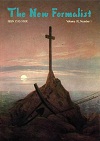—for George Good, with best wishes
Are poems entertainment? Well, let’s see—
They’re that and more. At least it seems to me
That poems are composed by those who long
To please their own dear selves. And if the song
Should prove delightful to some other folk
Why, so much for the better. But the joke
Is modernism simply won’t permit
Poets to write their verse as they see fit.
We’re shackled, bound, and muzzled; gagged and tied
Like wretched galley slaves who must abide
By prim, restrictive, arbitrary rules
Laid down by Amy Lowell and those fools
In 1912 or thereabouts to plague
A poet who’s not cryptic, arch, and vague.
That’s the real source of poison. That’s the thing
The gutless types at West Chester can’t bring
Themselves to mention, much less talk about,
For modernism still has lots of clout
And it’s perceived as risky to discuss
How the movement chokes and stifles us.
Oh no—we can’t say modernism’s bad!
H.L. Hix or Gioia might get mad.
We can’t contest the fiat of Ez Pound—
Not we poor humble rhymesters on the ground.
We cannot make our meter smooth as glass—
Hugh Kenner will rise up and bite our ass.
We must not ever notice (if we’re able)
The rotting corpse upon the kitchen table.
The formalistas of the present day
Are like good Germans, ready to obey
Whatever trendy Führer’s an der Macht—
Otherwise they’re shunned or snubbed or sacked.
And so they sit in sheep-like silence, cowed,
Lest they offend consensus and the crowd.
The lemmings in the workshops are afraid
They might not get a fellowship—or laid.
Tradition? Sure, it ought to be upheld,
But not encased in concrete, frozen, jelled.
No one today writes verse like Donne or Pope—
Some change is natural. But I surely hope
We recognize tradition as a chain
Linking us to a past that we maintain
Is still part of our current work, alive
With dynamism, like a buzzing hive
Where unseen sweetness rests in hidden combs
Like treasures safe in our ancestral homes.
Tradition is an arsenal of stuff:
Majestic, middling, or just flimsy fluff
Ready and waiting for the man who needs it,
And our own work augments and swells and feeds it.
Those jerks like T.E. Hulme and Madox Ford
Were desperate to destroy tradition’s hoard,
And Eliot, who should have known much better,
Went along with them, aider and abettor
Until he changed his mind—but far too late:
The modernists had long since left the gate.
It’s freedom that tradition gives us, friends—
The freedom to pursue poetic ends
Without some stupid academic ass
Telling us that we’re not allowed to pass
The boundaries that the modernists have set
(Like sharp chevaux de frise aux baïonnettes)
For what they call “a proper modern poem.”
Tradition lets us tell ’em off, and show ’em
We can write in the manner we deem best
Using whatever words and forms suggest
Themselves to us as helpful as we write.
And as for modernists, well they can bite
The Big One, as we say here in Noo Yawk.
Let ’em all go to West Chester and squawk.
The rest of us will follow the traditions
Uncowed by Amy, Ez, and their conditions.
That’s my indictment of the current stench—
I’m glad we have Scalia on the bench.



